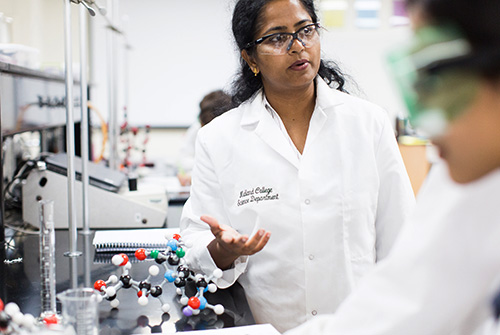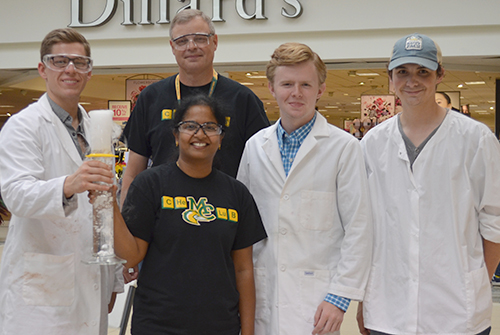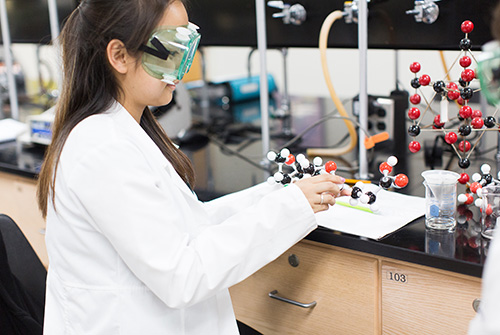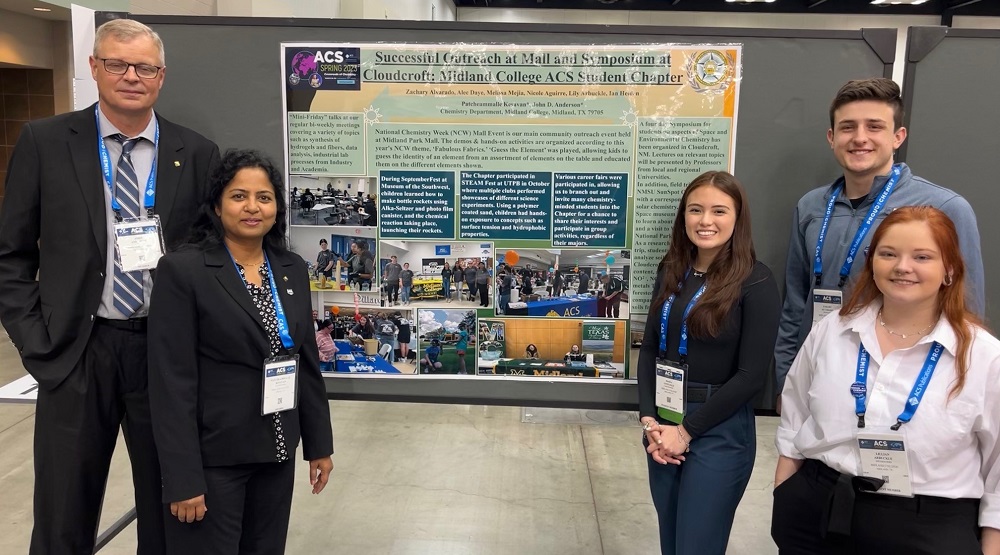Chemistry
Known as the Central Science, chemistry is the study of the structure, properties, composition and changes of matter. Because an understanding of matter’s fundamental properties is useful in so many different applications, chemical principles are helpful in fields such as biology, geology, medicine & pharmacology, engineering, & material science.
Typically Chemistry majors specialize in one of four major areas: Physical, Organic, Inorganic, or Analytical. They may also specialize in “hybrid” fields such as Biochemistry, Material Science, Geochemistry, or Pre-Med / Pre-Pharmacy.
We strive to provide students with the knowledge to pursue not only a degree in chemistry,
but also other technical fields, and to satisfy general degree requirements.
 |
 |
 |
Program Details
Select links below for details
Glen Richardson Memorial Scholarship
WOLFE SCHOLARSHIP
Contact Dr. Miranda Poage, Dean of Math and Science at mpoage@midland.edu or (432) 685-4615, for more information.
To be considered for a scholarship, please follow the link below:
MIDLAND COLLEGE/SUL ROSS STATE UNIVERSITY PROGRAM
Want to earn a Bachelor's Degree while staying right here at MC?
The Sul Ross @ MC Distance Program allows students to complete 11 different Baccalaureate degrees from Sul Ross State University while staying on the Midland College campus. Transfer up to 90 hours of lower level coursework directly into your selected degree plan. Advanced courses are presented via interactive televised lectures or web-based classes given by Sul Ross faculty, with labs being taught by Midland College faculty.
Transfer
Midland College has articulation agreements with a variety of schools and programs to assist our students with transferring to a university. Our curriculum maps, located in the catalog, provide a guided path for general transfer to our top five receiving institutions; however, your Pathways Advisor can assist you with a personalized plan for your specific transfer based on university and program. It is strongly recommended and encouraged that you contact your Pathways Advisor for assistance with course selection if you plan to transfer.
Texas University's with excellent Chemistry Programs
A fresh graduate from college with a Bachelor's in Chemistry Degree can earn $37,612 working in a state government as a researcher, which is equivalent to $19.59/hour!
Chemistry graduates can find job opportunities in all job sectors such as industry, academia, government, & entrepreneurship.
Applied Areas of Chemistry
|
|
First Friday Seminars
Organized by Dr. Tom Ready, the First Friday Seminars are a monthly event covering original research on a broad range of topics in science and mathematics. They are conducted at noon on the first Friday of every month. Admission is free, and the public is invited to attend.
MC Chemistry Club
The Midland College Chemistry Club is a nationally recognized student chapter affiliated
with the American Chemical Society (ACS). Meetings are conducted on a bi-weekly basis and include “Mini-Friday” seminars,
advanced topics presented by faculty and student members alike. Students of all majors
are welcome to meetings and events. For more information, contact Dr. Pat Kesavan
at (432) 685-6738 or pkesavan@midland.edu.
MC Undergraduate Research
Undergraduate research projects are conducted by faculty and students within the Chemistry
Department in a variety of areas such as: Water quality determination of local water,
synthesis of nano-particles, cathode materials for Li-rechargeable batteries, degradation
of coral reefs off the coast of Honduras, antibiotic resistance to triclosan, synthesis
of aerogels, and synthesis of new antibiotic drugs.
MIDLAND COLLEGE/SUL ROSS STATE UNIVERSITY PROGRAM
Want to earn a Bachelor's Degree while staying right here at MC?
The Sul Ross @ MC Distance Program allows students to complete 11 different Baccalaureate degrees from Sul Ross State University while staying on the Midland College campus. Transfer up to 90 hours of lower level coursework directly into your selected degree plan. Advanced courses are presented via interactive televised lectures or web-based classes given by Sul Ross faculty, with labs being taught by Midland College faculty.
PRIMARY CARE PATHWAY PROGRAM
Together with the University of North Texas (UNT), MC offers a plan where you can complete medical school in a seven-year, “2+1+4” plan, finishing your training a year before your peers.
Visit the course catalog for the most complete and up-to-date information.
MC Chemistry in the News
Three MC students presented at national meeting
Midland College (MC) Chemistry Club students and advisors attended the recent American Chemical Society (ACS) spring 2023 meeting in Indianapolis, IN, March 26-30. During the meeting, MC students Lily Arbuckle and Zak Alvarado presented on successful outreach activities of the MC Chemistry Club chapter.
MC student Maria Gonzalez presented her research on silver nanoparticle synthesis using green tea. Gonzalez is conducting this research with mentor Dr. Pat Kesavan, MC Chemistry professor, in the hopes of finding ways to deliver chemotherapy directly into tumor sites.
In addition to the presentations, the MC delegation attended the plenary session entitled “Chemistry at the Crossroads: The Development of Asymmetric Organocatalysis and Metallaphotoredox” presented by Dr. David MacMillan, 2021 winner of the Nobel Prize in Chemistry.
“Our students did a fantastic job and represented Midland College very well,” Dr. Kesavan said. “Besides the presentation from David MacMillan, we also attended a conversation with another Nobel laureate Carolyn Bertozzi. It was awesome to meet two Nobel laureates in one day! Dr. MacMillan’s presentation was especially powerful to young researchers.”
MC students and professors also discovered several new experiments to conduct in outreach efforts with local K-12 schools and connected with Salt Lake City Community College in order to collaborate on research.

Left to right: MC Chemistry Department Chair John Anderson, MC Chemistry Professor Dr. Pat Kesavan and MC students Maria Gonzalez, Zak Alvarado, and Lily Arbuckle.
ContactDepartment ChairDr. Pat Kesavan Faculty |
Division OfficeMath & ScienceAbell-Hanger Science Faculty Building |
Related Programs |
Related Resources |
Apply to MC Now
Thank you for choosing Midland College! If you are here to collect a few credits, take courses to transfer, or here to start a new career, we welcome you.